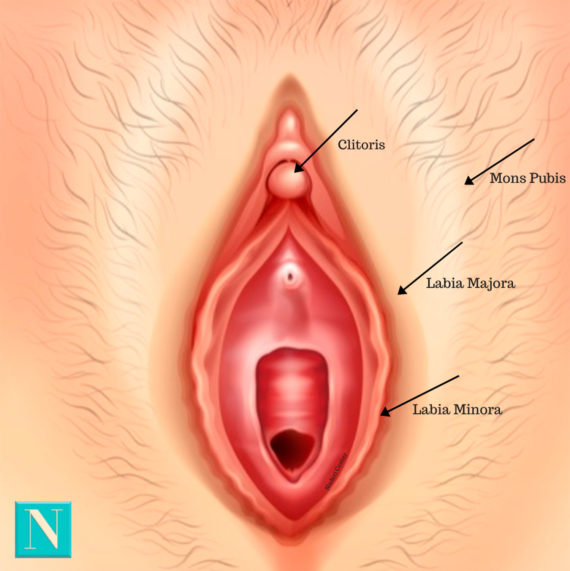Dhe Instagram appearance invites you to feel good. “Love yourself” is written on one tile, “Every day is International Women’s Day” on another. The site belongs to the plastic surgery practice of Pirkko Schuppan in Cologne. Her message: love yourself the way you are. And don’t be ashamed of what you want. Schuppan has specialized in interventions of a special kind: intimate corrections. A topic that is associated with feelings of shame for many. At the same time, thousands go under the knife every year in practices like Schuppan’s. According to surveys, there are more and more.
They have their labia reduced, their mons pubis sucked off or the so-called G-spot injected. Some surgeries are necessary because women experience pain and discomfort, for example during sports. Others aim to fulfill a beauty ideal or to boost sex life.
According to a survey by the Society for Aesthetic Plastic Surgery (DGÄPC), almost four percent of cosmetic surgery on women last year was on the intimate area. This makes the procedures almost as popular as nose surgeries. Exactly how many surgeries take place cannot be said. In a survey of doctors by the International Society for Aesthetic Plastic Surgery (ISAPS) in 2021, there is talk of around 12,000 intimate corrections for women in Germany – around 50 percent more than five years earlier.
However, both statistics only refer to figures from practices and clinics of aesthetic plastic surgeons. However, gynecologists can also carry out interventions. It is therefore likely that the number of intimate corrections is significantly higher.
If there is no medical necessity, the health insurance usually does not pay. And so more and more women pay thousands of euros out of their own pockets to an industry in which advertises to customers with flowery promises. True to the motto: There is nothing that a woman cannot have done. There is not always enough information about the risks. And the quality of the interventions varies.
“Women are more willing to talk about what bothers them”
With her practice, Pirkko Schuppan wants to stand for a serious approach to the subject. “In general, we see very clearly that intimate surgery is increasing,” says Schuppan. She doesn’t think that’s a bad thing per se. “Women today are more willing to talk about what bothers them and what bothers them.” The personal conversation before the operation is important, and at least two of them take place in her case. “The motivation has to be the right one.” That means she wants to help women who are suffering – and not fulfill any strange wishes. It often happens that she rejects patients after the preliminary talk.
There are two main reasons for opting for an intimate correction. For genetic reasons, large labia can already weigh heavily on teenage girls. They tear, become sore, especially during sports or during sex. Symptoms can also occur in old age and after childbirth, when the body changes.
Detached from this, however, there are also interventions that are not preceded by a medical reason. They’re just supposed to make things “prettier”. More beautiful, firmer, younger – these are also promises in the industry. The question is: Where are comprehensible wishes fulfilled – and where are new ones awakened?
“If the patient’s motivation is carefully questioned, we believe there is nothing to be said against such an operation,” says Henrik Menke, President of the Society for Plastic, Reconstructive and Aesthetic Surgery (DGPRÄC). “Here, as in many other areas of aesthetic surgery, we are quite critical of the fact that a standardized aesthetic appearance is becoming increasingly idealized.”
The media psychologist Ada Borkenhagen also finds this ideal of the vulva, i.e. the external female genitals, problematic. “The reason for this was the fashion trend towards full or partial removal of intimate hair,” says Borkenhagen, who researches the subject at the University of Magdeburg. The shave first exposes the intimate area – and has thus ensured that ideals of beauty penetrate into the underwear.
According to Borkenhagen, what female intimate areas should and shouldn’t look like is also determined by the media depiction of nudity. “The beauty ideal of a small, internal genital is reproduced, while the male genital should be large and prominent.” Men are also increasingly interested in intimate corrections, writes the DGÄPC, the most common intervention is penis enlargement. Women shouldn’t wear anything in bikinis or underwear – an ideal that can be seen every day in advertising, says Borkenhagen. Porn would also have helped to consolidate unrealistic ideals. Younger women in particular need better protection.
The Society for Gynecology and Obstetrics (DGGG) therefore follows a clear line, which rejects interventions for purely aesthetic reasons. “We are not there to implement any beauty ideals, but treat women with medical problems,” says their guideline officer Matthias Beckmann.
Beckmann, director of the women’s clinic in Erlangen, also criticizes the fluctuating quality of the interventions. “There is no statutory quality assurance for the resident colleagues who carry out such interventions,” says Beckmann. One result: Both Beckmann and Schuppan repeatedly have to operate on women whose first operation went wrong, as they report.
Beckmann sees a problem in the financial incentive to carry out many operations. Surgeons in private practice would find themselves in a dilemma. Those who provide too much information about risks ultimately earn less. “It’s not medicine, it’s a business,” he says. A first quality criterion can be the job title. Any doctor can call himself a cosmetic surgeon, because the term is not protected. It is different with the title of specialist in aesthetic plastic surgery.
Schuppan also bears this title. There are black sheep in every industry, she says. Where offers are too cheap, savings are made in the wrong corner. But: “Patients are also obliged to inform themselves about their surgeon.” It is important to her that her practice is there for women who really need help. Incidentally, she can understand her patients’ desire for surgery, she says. “I also know the feeling that something is bothering me,” says the surgeon. “Then why can’t I have it done?”
“Aha! Ten minutes of everyday knowledge” is WELT’s knowledge podcast. Every Tuesday and Thursday we answer everyday questions from the field of science. Subscribe to the podcast at Spotify, Apple Podcasts, deezer, Amazon Music or directly via RSS feed.




